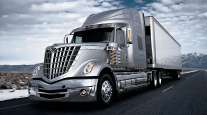Navistar CEO Troy Clarke Opens Door to Partners as Truck Market Sours

Navistar International Corp. CEO Troy Clarke is pushing the door open for potential deals as he fights to keep the truck maker’s turnaround on track amid a U.S. sales slump.
"Everything we're doing today just makes us a better partner," Clarke told Reuters during a recent interview at the company's Lisle, Illinois, headquarters. "Everything we do is just making a better company that performs well."
Analysts have speculated that Navistar could be a candidate for an acquisition or alliance, possibly with the truck operations of German automaker Volkswagen AG.
Navistar, under Clarke, agreed to manufacture a line of medium-duty trucks for the CEO's former employer, General Motors Co., due to launch in 2018 for sale through GM's Chevrolet brand.
"We have the opportunity to do more of those kinds of things in the event we continue to remain a stand-alone company," Clarke said. "On the other hand, there are companies out there that could use our ability to do that kind of stuff to grow their footprint in North America."
Clarke has signaled his openness to prospective partners in the past, although he has not addressed the issue as directly in recent calls with analysts. His comments to Reuters come as the company is under increasing pressure.
Navistar still is recovering from disastrous missteps on emissions control technology that led many customers to take business elsewhere over the past several years.
Clarke has promised the company will generate profits and cash flow this year after losing $187 million on $10.1 billion in revenue in 2015. But he is fighting a slump in U.S. commercial truck sales that has accelerated during the past several months.
Orders for Class 8 highway trucks — the 18-wheelers that haul freight across the country — fell 25% to 284,000 vehicles in 2015 and could tumble to 250,000 this year, industry forecasters said. January orders were down 48% on the year, according to freight transportation forecaster FTR.
Navistar's shares are off more than 70% from a year ago, and its market cap of $720 million is less than its cash on hand of around $1 billion.
Navistar is one of several big heartland manufacturers, including heavy-equipment maker Caterpillar Inc. and farm machinery giant Deere Co., stuck in a rough spot of the uneven U.S. economy. Navistar, which makes school buses, dump trucks and gleaming Class 8 tractors, has been caught by a cyclical downturn with about 18 months left to go in its turnaround effort.
"The new management has done a good job, but you would never know it from where the stock is," BB&T Capital Markets analyst Rhem Wood said.
As the market has soured, Daimler Trucks announced in mid-February it would cut 1,250 jobs in North America. Similarly, Swedish truck maker Volvo said last month it would cut North American production.
Clarke said his promise of profits this year, which he is not backing away from, took into account a weak market.
“We anticipated the market being where it is,” he said. “The rumors that suggest it could be worse, we don’t believe that.”
The future of Navistar and its 14,400 employees worldwide will depend on a small group of investors that includes Carl Icahn, who controls 19.96% of the company. The top 10 investors in Navistar control more than 90% of the stock. Icahn's associates did not respond to a request for comment.
Volkswagen said in February it may pursue acquisitions or a public listing to grow its truck business, which has no significant presence in North America.
Navistar is seen as an attractive target because it has a larger North American dealer network than rival Paccar Inc. An ongoing emissions scandal at VW means the timing of any move is unclear.
Clarke and his team have shed staff and cut costs, with $200 million more in cuts planned for this fiscal year ending Oct. 31.
Some analysts question whether that will be enough. Joel Tiss, at BMO Capital markets, estimates Navistar could burn through $300 million in cash this year and up to $400 million in 2017 if the downturn continues.




